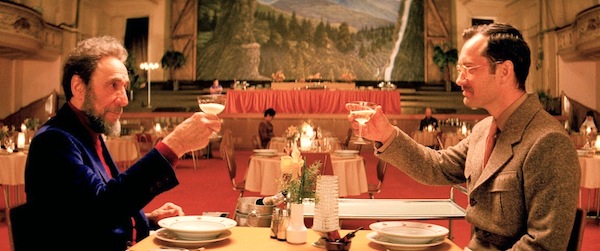

I was bonding with a friend in New York last week over our mutual affection for the new Wes Anderson film, The Grand Budapest Hotel. After swapping a few favorite lines, he asked, with a twinkle in his eye, “So how’re you going to shoe-horn this one into your theological framework?” Quick wit that I am, I responded, “A story about adoption and inheritance that ends with an act of radical self-sacrifice – probably won’t need my shoehorn for this one”. Badabing! Obnoxious, I know. What’s even more obnoxious is that I’d been thinking for days about Grand Budapest and was probably waiting for someone to ask me about it. That we were at a conference dealing with the topic of identity compounded the irony. No other filmmaker has become a more reliable lightning rod for indie identity politics than Wes Anderson.
But first, the movie itself. How many films can you claim you enjoyed every single scene in? The delight of Grand Budapest is almost too much. You can’t really compare it to anything, not even his other films, at least not meaningfully. They’re all terrific in their own way. In fact, the main feeling I took from my first screening was a sense of gratitude that I get to live in a time when this guy is making movies. Seriously.
 There were too many favorite jokes/gags to count. An initial list might include the ridiculous romantic poetry (“‘Farewell!’ cried the wounded piper boy whilst the muskets cracked and the yeoman cried ‘Hurrah!'”…), the tiny digging instruments, the toy gun interruption, the Egon Schiele stuff, Monsieur ‘Chuck’, the doorway to Checkpoint 19, the second copy of the second will, the Mexico birthmark, the body language of the displaced monk, I could go on and on. And let’s face it – the script contains the most inventive and hilarious use of the f-bomb this side of Kenny Powers.
There were too many favorite jokes/gags to count. An initial list might include the ridiculous romantic poetry (“‘Farewell!’ cried the wounded piper boy whilst the muskets cracked and the yeoman cried ‘Hurrah!'”…), the tiny digging instruments, the toy gun interruption, the Egon Schiele stuff, Monsieur ‘Chuck’, the doorway to Checkpoint 19, the second copy of the second will, the Mexico birthmark, the body language of the displaced monk, I could go on and on. And let’s face it – the script contains the most inventive and hilarious use of the f-bomb this side of Kenny Powers.
Then there are the aesthetic choices: the Caspar David Friedrich mattes (a Friedrich painting just so happens to adorn the cover of Grace in Practice…), the manicured Austrian sweets, Our Holy Father of the Sudetenwaltz, the armored hallway of the Kunstmuseum, the myriad hatches and compartments and safes in the hotel and prison, the railways and cable cars, the Society of the Crossed Keys outfits.
Acting-wise, Ralph Fiennes turns in a performance for the ages. And the kid (Tony Revolori) is really good too. Favorite bit player would probably have to be Jeff Goldblum, though Tilda Swinton and Tom Wilkinson ham it up nicely as well. If I had to pick bones–for fun, mind you–they’d probably have to do with Adrien Brody’s character and the cameo fatigue that sets in about two-thirds of the way. The direction is no more emotionally accessible than any of his other films (a tad less than Moonrise perhaps) but to complain on that level feels like a gripe with the film’s existence rather than its style. Meaning, it wouldn’t be a Wes Anderson film if we didn’t feel that we were on the outside looking in. This is a different cinematic experience but not an invalid one.
But as glorious as the window dressing on this film may be, there is something deeper going on as well. Other reviewers have noted that this is probably Wes’ fastest paced film, the closest he’s come to a bonafide ‘romp.’ Yet the occasion for the hijinks–escalating fascism–is the closest he’s come to real menace or, dare I say, evil. In fact, the candy-coated breathlessness runs so thick that he would have lost the tragic context had he not taken special care to frame the story in with the present day, 1985 and 1968. The framing also makes clear that Moustafa’s siloloqy is fundamentally one of grace, his response not just to being loved by a father-figure, but being saved by one. What does the ‘glimmer of civilization in this barbaric slaughterhouse we once called humanity’ actually look like? It looks like a man giving his life for his adopted child. Hmmm…
And that’s where the actual target of the nostalgia comes in. As exquisite as they may be, it’s not a nostalgia for a particular time and place that may never have existed, but for specific people (Gustave and Agatha), who loved this young refugee at a cost to themselves, and therefore made all the difference in his life. A nostalgia for a mountaintop experience, pun intended. The faded husk of the Iron Curtain-era hotel becomes a memorial to radical generosity, which ‘the writer’ harnesses to fashion a memorial on the printed page, which then turns into an actual memorial in a graveyard, to which followers pay homage. Even to those on the outside looking in–like the teenager bringing the key to the graveyard–the story retains its power and therefore its hope.

Of course, as has become a ritual with Wes Anderson films, one then has to wade through the reviews, many of which seem to feel an obligation to justify or even apologize for their love of the filmmaker, as if to proclaim one’s unqualified admiration risks living into an undesirable archetype (or at least one that hampers the very individuality Wes personifies). Which it probably does. Suffice it to say, if you’re looking for examples of well-heeled young people wrestling with the law of Thou Shalt Not Be Predictable, or whatever hipness code fuels the contrarianism surrounding Wes, simply google reviews of the film.
Wes has, by and large, managed to stay one step ahead of his critics, always bringing unexpected new angles and obsessions to the table, following his muse wherever it may lead and integrating his favorite elements into each new project with increasing confidence. As many similarities as the two films have (hotel boy meets lobby girl), if Moonrise roped lots of new fans into the cult, Grand Budapest might be a latticed miniature bridge too far, a little too mad-cap for some. The more developed and eccentric the director’s vision grows, the stronger an identity marker one’s fandom becomes. It’s unavoidable: there are those who ‘get it’ (as M. Gustave quips), and those who don’t. Some would say it’s become virtually impossible to discuss Anderson’s work without delving into the identity politics we tried to deconstruct last week.
I know that’s the case for me. In fact, an article in Salon by Marc Spitz called “It Isn’t Easy Being Twee” provoked something of an identity crisis in yours truly on the eve of the conference. He wrote:
Standing in line the other day to see his new film, “The Grand Budapest Hotel,” I have long since dispensed with my insecurity that there was perhaps no there-there when it came to calling Twee a thing. I realized in that lobby that the opening of Anderson’s films are akin to when a new Marvel hero flick drops, those Avengers movies or a new Spider-Man. They are events. The films themselves are full of triggers (cameos by beloved Anderson collaborators like Owen Wilson and Bob Balaban, and of course Bill Murray), and signals to his devoted (“Rudeness is merely the expression of fear,” one character declares in Budapest). It reminded me of that line in the Smiths’ “I Know It’s Over,” where Morrissey sings, “It’s so easy to laugh, it’s so easy to hate. It takes strength to be gentle and kind.” Morrissey, there was another giant who owned his Twee, and never sold it out. Many believe we need their example now, perhaps more than ever.
No one likes being reduced to a category, but I’d be lying if I didn’t recognize myself in his description. Am I twee? Lord have mercy! To these ears, ‘twee’ conjures up bed-wetters and scarves and diaries. It has no edge. But the truth hurts–and there’s probably something inescapably twee about writing about not wanting to be twee. Remember that scene from The Last Days of Disco, where someone accuses the protagonists of being ‘yuppie scum’? The exchange translates to twee or hipster (or Pharisee for that matter):
Des McGrath: Do yuppies even exist? No one says, “I am a yuppie,” it’s always the other guy who’s a yuppie. I think for a group to exist, somebody has to admit to be part of it.
Dan Powers: Of course yuppies exist. Most people would say you two are prime specimens.
Ooof. When I read Spitz’s article I felt a tinge of the anxiety that David Foster Wallace mentioned in the quote we posted yesterday, the sensation of “being trapped in a self” being a foreshadowing of death. If your identity can be pinned down, even in something as banal as ‘twee’, then it can be judged, and nothing is scarier than that. Spitz had thrown my proverbial cat out the window. I’d have to find a new self!
If there’s good news here, perhaps it lies in the fact that none of us are strictly one thing or another, good or bad, lovable or unlovable, preppie or hippie, twee or punk. The containers we choose for our selves may make us feel safe (and valuable) for a while, but they all crumble in the face of eternity. And what’s left? I imagine it’s something that binds us together rather than separates. Cue Francis Spufford and his interview in The Mockingbird:
Our form of celebrity worship has a particular edge of resentment to it, in which we hate them as much as we love them. And we admire them and kick them, and they become these rather unpleasant carnival float characters, who are there to be punched as much as loved. We kind of work out our disappointment at ourselves on them, in a way that never learns anything, and is ceaselessly renewed. The next one is supposed to be perfect and shiny, and then proves not to be, and the cycle of spite continues… You expect the best, you expect the best, you expect the best, you’re gonna be surprised with the worst when it comes. You stick your fingers in your ears and you default back to expecting the best again and that takes care of the cruelty and the optimism. It seems to me to be an amazingly effortful way to live as well, don’t you think? The effort of maintaining those optimistic masks…
M
It’s exhausting.FS
Absolutely! It’s a deep relief just to be a sinner, I can tell you that much. But… it’s very hard from a standing start to persuade people that seeing yourself as a sinner is a relief. That it might conceivably be a way of being kind to yourself. Of letting yourself off the hook of perfectionism. It has to be near the beginning of explaining why a story of redemption makes sense now…
https://www.youtube.com/watch?v=l60Pcw87bwQ&w=600
One final stray thought. We’ve spoken elsewhere about the ‘mancession’, the so-called crisis of masculinity in the West, and the scores of underachieving young men out there. Esquire ran a horrifying article about ‘the drugging of the American boy’ the other day. This is one place where Wes Anderson may be able to help us. I’m not kidding. It may not be an ‘agenda’ per se (thank God), but in his work he has presented, over and over again, a positive and very much undrugged vision of what it means to be a boy: full of adventure and curiosity, danger and gadgetry, and even the possibility of heroism, while never demeaning or coming at a cost to women. Coincidentally, this is also where the word ‘twee’ runs out of steam. His protagonists are seldom all that bookish or wimpy, but neither are they meatheads. There’s an in-between here, and I find it to be a very hopeful one.

COMMENTS
7 responses to “Glimmers of Civilization (and Grace) in The Grand Budapest Hotel”
Leave a Reply













Nice review, Dave. I too found GBH to be completely enjoyable, and endlessly amusing. Some of Anderson’s funniest moments to date. Keitel’s tattoos, for example. Clearly you live and breathe an appreciation for this Mr. Anderson, which I respect.
You must have seen a different movie than I did. Anderson is all atmosphere. And you are right about one thing in particular–his movies are about boys.
Can’t wait to see it. I’ve heard it’s a cross between Royal Tennenbaums and Moonrise Kingdom. If that’s remotely true, I’m all in.
Just saw this movie last night – loved it, mostly for what I think all movies should also do….’look’ beautiful. Also noticed the format of the movie was not as wide, or more tall…http://blog.criterioncast.com/post/62165270728/matt-zoller-seitz-and-wes-anderson-chat-about-aspect